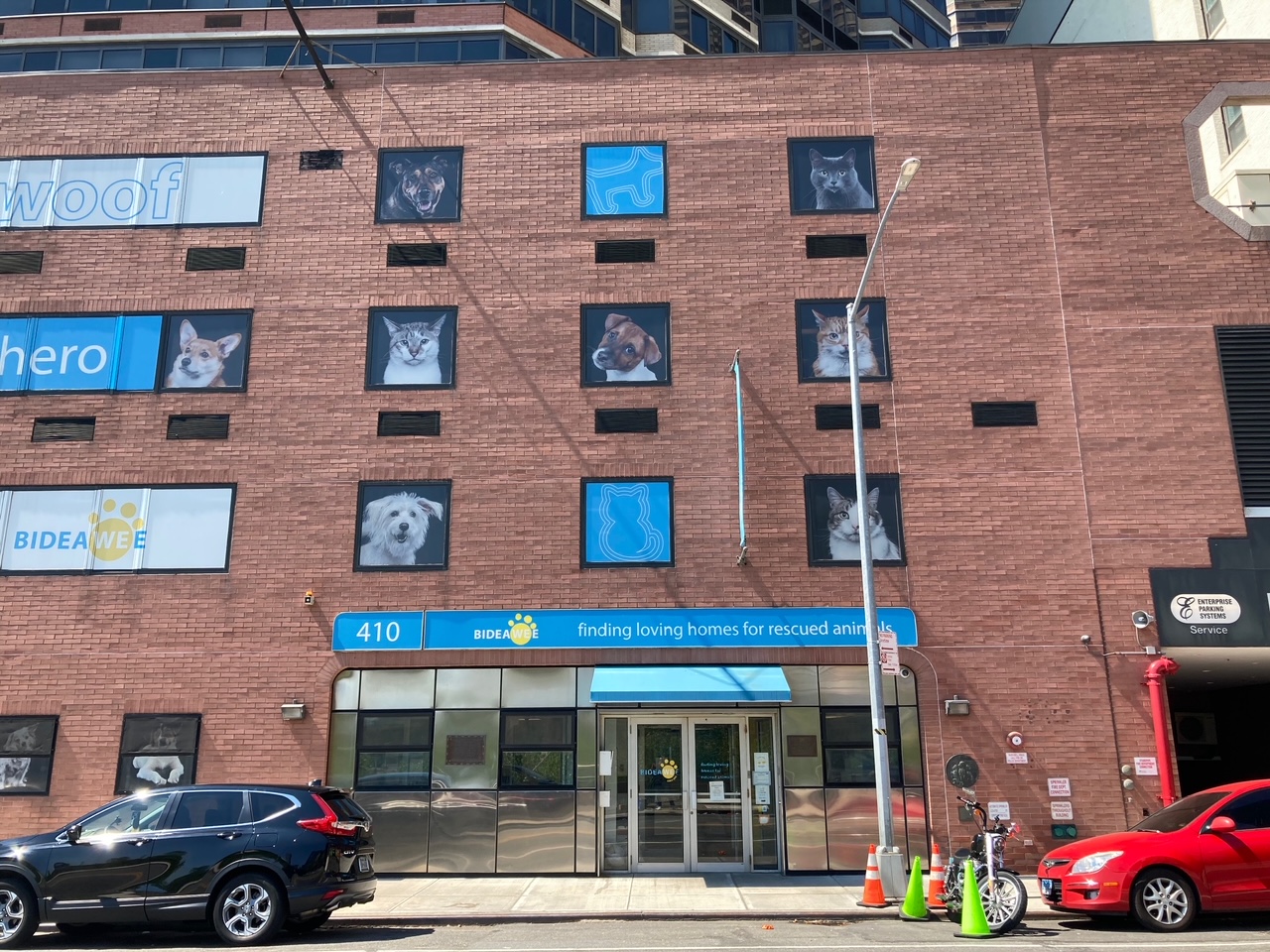
It’s been more than two years since the start of the pandemic where there was a significant increase in animal adoptions, known as the “pandemic puppy craze.” Now, animal shelters across the country have been experiencing a lull in adoptions.
Bideawee is one of the country’s oldest and most respected animal welfare and pet adoption organizations. They have locations in New York City, Wantagh, and Westhampton, and they are encouraging the community to consider bringing a deserving and lovable pet into their home.
The staff and volunteers at Bideawee provide amazing services to all the animals in their care, but the goal of any shelter is always to get pets adopted and living in a loving home where they can thrive outside the shelter walls.

Leslie Granger, CAWA, President, and CEO of Bideawee spoke more about the shelter’s mission, how the community can get involved, the merits of fostering and adopting, and what wonderful family members shelter pets make!
Can you tell us about Bideawee’s mission?
LG: Bideawee, which means “stay awhile” in Scottish, is one of the country’s oldest and most respected animal welfare and pet adoption organizations. Founded in 1903, Bideawee’s mission is to create and strengthen the human-animal bond through best-in-class lifesaving and compassionate care for pets and the people who love them.
Would you discuss the lull in adoptions and how this may have been affected by the pandemic?
LG: Bideawee is finding, like so many animal shelters across the country, that our animals are simply not leaving our doors as quickly as they once did. And, when that happens, it means we have no room for other animals in need of our shelter and services. Some people may be returning to the office as pandemic restrictions lift a bit, thinking that they don’t have the time for a pet; others may be gearing up for a summer of travel; and some people may just be at their four-legged capacity, but no matter the reason, many of our sweet, loving animals are sticking around the shelter for longer than they should. And it doesn’t help that this lull comes smack dab in the middle of kitten season – the months in which cats tend to have their kittens. We are always inundated with kittens and adult cats during this time. But these days, we’re also seeing puppies who are starting to grow up in our shelters. Generally, puppies tend to fly in and out of our shelters rather quickly and to see them literally grow before our eyes is a real visual reminder of this serious lull.
What would you like people to know about shelter pets?
LG: I think it’s important to remember that animals are brought to a shelter for a variety of reasons. We partner with various municipal shelters to help bring dogs and puppies to the safety of Bideawee. Most of these dogs are healthy, friendly, highly adoptable puppies and adolescents that are coming from cities with major pet overpopulation issues and just have a better chance at finding a loving home at Bideawee. We also have many older dogs and cats at the shelter. We often rescue senior animals because they make wonderful pets. Many senior animals are already socialized, have wonderful temperaments, and make calm, loving companions. Overall, I’d want people to recognize that they can find all kinds of wonderful pets at shelters: different breeds, sizes, activity levels, temperaments. There is a pet for every personality and lifestyle at a shelter.
Many people also have concerns about animals that have been returned and I’d want people to understand that pets are returned for all kinds of reasons, many due to no fault of the pet. Sometimes people’s circumstances change, sometimes people are not prepared for the responsibilities of being a pet parent, and sometimes, a particular animal just isn’t the right fit for a particular family. That doesn’t mean they won’t be the right fit for yours.
There are also animals that come to us because their pet parents can no longer care for them. Perhaps it’s due to a financial hardship, moving to an apartment that does not allow pets, or due to the pet parent’s own failing health. And some are simply abandoned with no explanation. But no matter the circumstances, all of these animals are deserving of love and care.
How do you keep Bideawee running smoothly on a day-to-day basis? What are some of the crucial factors that allow you to give shelter pets the care they need?
LG: There are so many factors involved in running a successful nonprofit. If I had to boil it down to the core principles that have sustained and driven Bideawee for the last 119 years, I’d attribute our success to passion, commitment, and community. An organization is only as great as those who embody its mission and we have cultivated a community of incredible talent, passion, and dedication. From our staff to our volunteers to our adopters, clients, donors, and board, we have ambassadors at every level of the organization committed to ensuring the health, happiness, and well-being of our animals.
Can you discuss the merits of fostering as well as adoption?
LG: Often, we think about animal adoption as a person coming in and saving an animal, but the reality is that both parties really benefit when an animal is brought into the home. I think we really saw that during the pandemic. Fostering an animal is deeply rewarding for all parties and people might not even know it’s an option. With fostering, the animal benefits from a safe, loving environment while shelter staff search for a forever family. Even though Bideawee staff cares so lovingly for all the animals in its care, it’s always preferable for the animal to spend their time in a home. Individuals and families enjoy their time with the animal, knowing they are a vital part of its life and journey toward a forever home. Shelters benefit because every time an animal is taken into a foster situation, that opens up a critical space inside the shelter for another deserving animal in need of care. Fostering can be a great opportunity for families with a limited time commitment, teachers who have summers off, members of the armed services who may be home for an extended period of time before being deployed, and those who could benefit from an opportunity to see if they are ready to adopt an animal.
Can you talk about all the services Bideawee provides for animals as well as their owners?
LG: Bideawee has two adoption centers – one in our headquarters in Manhattan and another in Westhampton on Long Island. Bideawee has an intake center in Wantagh, also on Long Island. Occasionally, Bideawee will adopt animals out of this space. Adoptions also take place at events throughout the boroughs and Long Island in our mobile adoption van. We have a robust volunteer and foster program. We also have a Pet Therapy Program which gives pet parents the opportunity to have their animal certified as a pet therapy partner so they can visit various facilities like schools and hospitals. Additionally, Bideawee has a public animal hospital at our Westhampton facility and two Pet Memorial Parks, one in Wantagh and one in Westhampton. Most recently, Bideawee created and launched our Community Initiatives Program, designed to support pets and the communities in which they reside with programs like Bideawee’s Feral Cat Initiative (FCI), which humanely reduces the number of free-roaming cats and kittens being born on the streets, thereby reducing the number that enter shelters each year. And our newly launched Community Wellness Clinics and pet food giveaways provides the necessary preventative veterinary care and pet food to keep pets healthy, keep their food bowl full, and keep them with the people who love them.
Can you tell us about the different programs Bideawee runs?
LG: Bideawee’s programs include:
- The Feral Cat Initiative, which supports community efforts to humanely reduce the population of free-roaming cats in New York City through the practice of Trap-Neuter-Return (TNR). The program offers a host of classes and webinars educating participants about TNR, how to create winter shelters for community cats, and how to bottle feed kittens – just to name a few. And because our programs turned into webinars during the height of the pandemic, we have been able to reach participants literally all over the world!
- Pet therapy, which comprises teams of dogs and a pet parent which are trained by Bideawee staff. These teams then go out into the community to provide various therapeutic assistance. Bideawee’s Reading to Dogs program helps young kids who struggle with reading practice their skills in a comfortable setting. Pet therapy teams visit to local schools and libraries where the young students read books to a non-judgmental audience: a sweet and gentle pup. Therapy teams also go to hospitals, college campuses during midterms and finals, and airports to help provide a stress-free visit with a sweet dog.
- Loving Legacy protects a pet’s ongoing care should something happen to its pet parent. With program enrollment, Bideawee pledges to step in and care for beloved dogs and cats when their owner pre-deceases them or is rendered incapacitated and can no longer look after them. It’s a trust to cover the care of your pet for the remainder of its lifetime.
- Our Veterans Pet Project allows veterans to adopt an animal from Bideawee with additional benefits. Bideawee will waive the adoption fee and veterans will get the first veterinary exam free and 20% off all veterinary exam fees thereafter.
- Snuggles for Seniors encourages seniors to experience the love and comfort of animal companionship by offering all seniors 65 and older free adoptions on animals four-years-old and up.
How do the three different Bideawee locations run in conjunction with one another? Can you tell us a little about each one?
LG: Our Manhattan site has an adoption center that is open to the public and hosts numerous opportunities for volunteers. Our Westhampton site on Long Island has an adoption center, an animal hospital, a host of volunteer opportunities, and a Pet Memorial Park, in which thousands of pets have found a peaceful resting place. And our Wantagh site on Long Island is our PAWS intake center – the first stop for nearly all of the animals we serve. There they receive medical exams, vaccines, a bath, and are often spayed or neutered if they are not already, before being sent to either our Manhattan or Westhampton adoption center. We also welcome volunteers at this site. Our Wantagh site also hosts a Pet Memorial Park and occasionally, we will adopt some animals from that location. Although there are different sites, we really operate as one unit with a dedicated staff.
What are the best ways the community can get involved?
LG: There are numerous ways for the community to get involved. We welcome volunteers and have a big need for in-shelter animal care volunteers (in addition to volunteers in other areas) and we encourage you to apply on our website. We’re also always looking for new foster parents and again, you can apply on our website. Additionally, if you’re passionate about cats and looking for a way to help the community cats in your neighborhood, you can learn more by visiting the FCI section on our website.
What’s the most important thing you’d like the community to know about Bideawee and choosing to adopt?
LG: Keep an open mind. You may walk through our doors because of a sweet face you saw on our website, but our adoption center staff has the knowledge and experience to make great animal/human matches. Our staff thinks about the size of your home, if you have children, other animals, and other lifestyle factors that you might not think of, but are vital. They know the personalities and needs of the animals and work hard to make good pairings. So often, people imagine adopting a puppy or a kitten. But the reality is there are so many older animals that are just as sweet and deserving of a home and a family. And sometimes these animals wind up being a better fit for the people who come in to foster and adopt. Most importantly, understand that pets are family. They aren’t disposable; when we adopt a pet, we are making a promise to care for them in sickness and health, through old age, moves, when our family expands, and all circumstances in between.
Are there certain stigmas you try to educate individuals about when it comes to shelter pets and even specific breeds?
LG: The large majority of the animals in our shelters are mixed breeds. But, regardless, it’s important to remember that every animal is an individual with a unique personality and temperament.
For more information about Bideawee, visit www.Bideawee.org.












